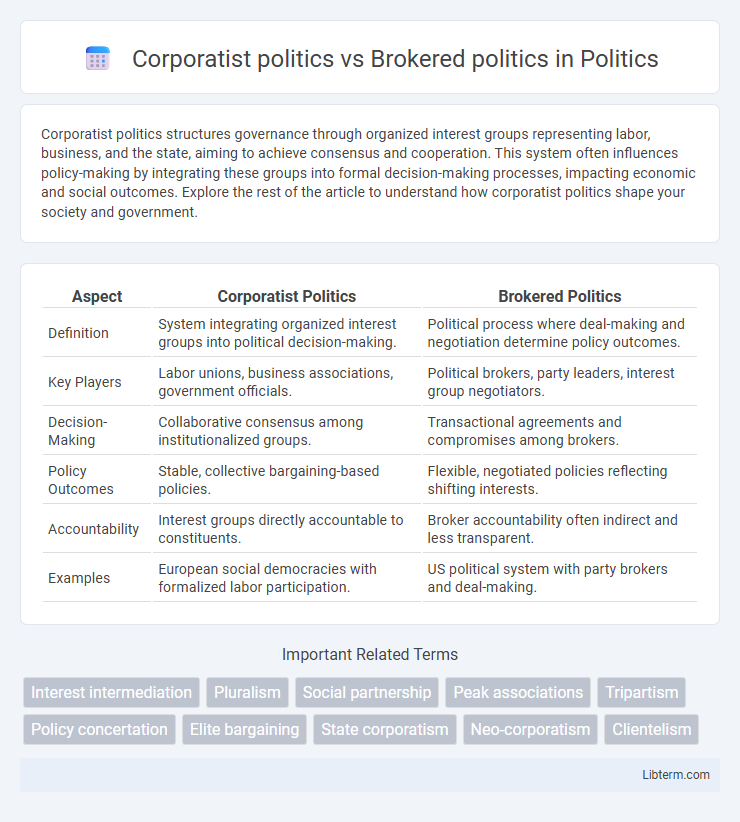Corporatist politics structures governance through organized interest groups representing labor, business, and the state, aiming to achieve consensus and cooperation. This system often influences policy-making by integrating these groups into formal decision-making processes, impacting economic and social outcomes. Explore the rest of the article to understand how corporatist politics shape your society and government.
Table of Comparison
| Aspect | Corporatist Politics | Brokered Politics |
|---|---|---|
| Definition | System integrating organized interest groups into political decision-making. | Political process where deal-making and negotiation determine policy outcomes. |
| Key Players | Labor unions, business associations, government officials. | Political brokers, party leaders, interest group negotiators. |
| Decision-Making | Collaborative consensus among institutionalized groups. | Transactional agreements and compromises among brokers. |
| Policy Outcomes | Stable, collective bargaining-based policies. | Flexible, negotiated policies reflecting shifting interests. |
| Accountability | Interest groups directly accountable to constituents. | Broker accountability often indirect and less transparent. |
| Examples | European social democracies with formalized labor participation. | US political system with party brokers and deal-making. |
Introduction to Corporatist and Brokered Politics
Corporatist politics involves structured collaboration between the state, labor unions, and business groups to create policy consensus, emphasizing organized interests within formal institutions. Brokered politics centers on political intermediaries who mediate between interest groups and government, facilitating negotiation and compromise across diverse stakeholders. Both systems shape governance through distinct mechanisms of interest representation and policy-making processes.
Defining Corporatist Politics
Corporatist politics centers on structured collaboration among government, labor unions, and business groups to formulate policies, emphasizing organized interest representation and collective decision-making. This approach fosters institutionalized negotiation processes, promoting social harmony and economic coordination through legally recognized interest groups. Unlike brokered politics, which relies on informal bargaining and individual political actors, corporatist politics institutionalizes cooperation within defined sectors for policy stability and consensus-building.
Understanding Brokered Politics
Brokered politics involves negotiation among multiple stakeholders, often requiring intermediaries or brokers to mediate conflicts and build consensus. This model contrasts with corporatist politics, where interest groups formally integrate into policy-making structures, limiting the need for constant bargaining. Understanding brokered politics highlights the fluidity and adaptability of political alliances in pluralistic societies.
Historical Origins and Development
Corporatist politics originated in early 20th-century Europe, particularly in countries like Italy and Germany, where the state sought to integrate interest groups into formal decision-making structures to manage social and economic conflicts. Brokered politics emerged primarily in the United States, rooted in the late 19th-century urban political machines that mediated between diverse social groups and political interests through negotiation and alliance-building. The development of corporatism emphasized state-led coordination of sectors, while brokered politics relied on informal agreements and power brokering among political actors to maintain stability and control.
Key Actors and Institutions
Corporatist politics centers on formalized cooperation among key actors such as business groups, labor unions, and government institutions, often institutionalized through peak associations and state-sponsored negotiation forums. Brokered politics relies on political intermediaries or brokers--such as party leaders, interest group representatives, and influential lobbyists--who navigate fragmented interest groups and negotiate outcomes within pluralist and often competitive political systems. Key institutions in corporatist politics include tripartite councils and sector-specific regulatory agencies, whereas brokered politics unfolds primarily through party organizations, legislative committees, and informal networks that mediate between diverse stakeholders.
Decision-Making Processes
Corporatist politics centralize decision-making through negotiated collaboration among key interest groups such as labor unions, employers, and the government, ensuring structured inclusion and stability in policy outcomes. Brokered politics distribute decision-making power among diverse and often competing interest groups, relying on negotiation and compromise to build coalitions and pass legislation. The corporatist model emphasizes formalized agreements and consensus, while brokered politics depend on fluid alliances and political bargaining.
Advantages and Disadvantages
Corporatist politics streamlines decision-making by integrating major interest groups directly into policy formulation, fostering stability and coherent economic planning, but it risks marginalizing minority opinions and entrenching elite power structures. Brokered politics emphasizes negotiation among diverse competing interests, enhancing pluralism and responsiveness to varied constituencies, yet it often results in fragmented policies and slower legislative processes due to constant compromise. Each system balances efficiency and inclusivity differently, impacting governance outcomes and democratic representation.
Impact on Policy Outcomes
Corporatist politics often lead to more stable and targeted policy outcomes by institutionalizing collaboration between government, labor unions, and business groups, resulting in coordinated economic strategies and reduced conflict. Brokered politics emphasizes negotiation among diverse interest groups and political actors, which can produce more fragmented and incremental policy changes due to competing demands and less centralized decision-making. The impact on policy outcomes diverges as corporatism fosters consensus-driven reforms, while brokered politics encourages pluralism but may slow comprehensive policy implementation.
Global Examples and Case Studies
Corporatist politics feature structured collaboration between government, labor unions, and business groups, as exemplified by Sweden's consensus-driven policy-making and Germany's social market economy. Brokered politics rely on intermediaries balancing diverse interests through negotiation and coalition-building, evident in the United States' federal system and India's coalition governments. Comparative studies reveal that corporatist frameworks excel in policy stability and social harmony, while brokered politics offer flexibility in pluralistic societies with fragmented political landscapes.
Future Trends and Challenges
Corporatist politics, characterized by institutionalized collaboration between government, business, and labor groups, faces challenges from increasing public demand for transparency and digital participation, potentially reducing the influence of traditional interest groups. Brokered politics, involving negotiation among diverse and often fragmented actors, is expected to adapt through enhanced data analytics and AI-driven decision-making, enabling more dynamic coalition-building but also raising concerns about misinformation and polarization. Future trends suggest a hybrid model integrating corporatist stability with brokered flexibility may emerge to address complex governance challenges in rapidly changing political landscapes.
Corporatist politics Infographic

 libterm.com
libterm.com